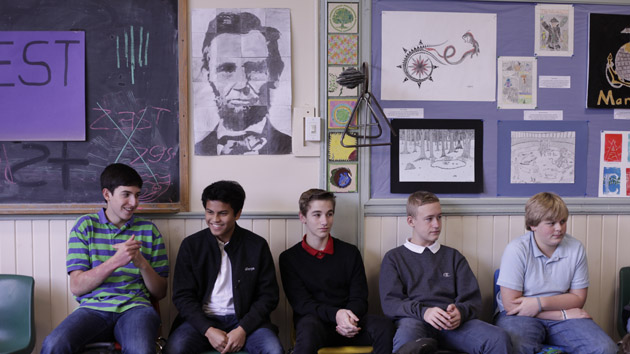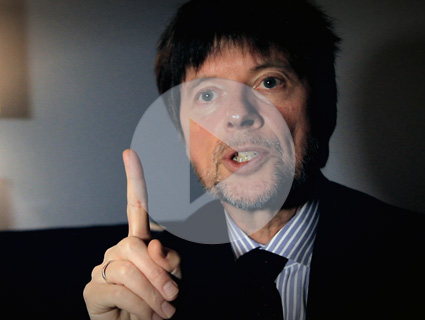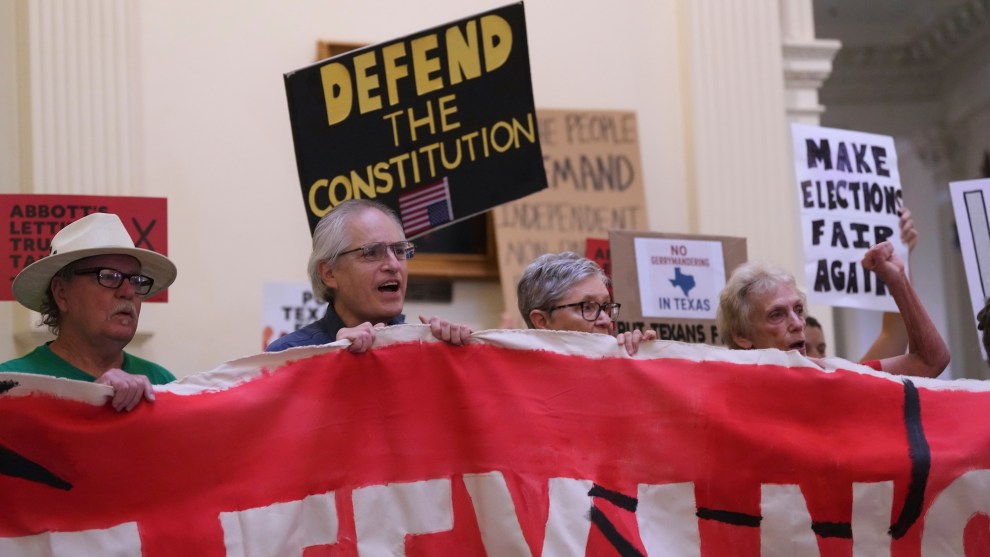To acclaimed filmmaker Ken Burns, it’s a no-brainer: If Jackie Robinson were still alive today, he’d be the most beloved figure in the African American community. “The tragedy is that we’ve mythologized him,” Burns says, “and the real tragedy is he died young.”
On Monday, four days before the 69th anniversary of Robinson’s major league debut at Brooklyn’s Ebbets Field, PBS will air the first episode of Burns’ latest documentary, the two-part biography Jackie Robinson. Burns says the film is influenced both by his 1994 epic on the history of baseball and the persistence of Jackie’s widow, Rachel—”without her,” he says, “Jackie would not have been able to make it.” At its heart, the doc is an attempt to go beyond mythology to reveal more about the complicated life of a pioneering ballplayer who, Burns adds, “helped to ignite the modern period of civil rights.”
Ahead of Monday’s premiere, Burns spoke with Mother Jones about the life obscured by Robinson’s legacy, the limitations of the slugger’s fame, and the apocryphal stories still making the rounds today:
Robinson the man was much more complex than Robinson the legend: “You get rid of this sentimental nostalgia about Jackie, that he’s the ‘good Negro’ who turned the other cheek and behaved the way a Negro is supposed to at that time, and understand the fiery, competitive kid who’s unwilling to accept second-class status—and how he carried that throughout his professional life and into his post-baseball life until the very end. It’s an existential story about not just talking the talk, but walking the walk. We begin to realize how important Jackie is. He is obviously the most important person in the history of baseball, and I would suggest in American sports. But the story goes way beyond that.”
“It’s about Black Lives Matter”: “We felt that once you’re free from the barnacles of that sentimentality, once you’ve liberated them from the mythology, then all of a sudden, what’s this film about? Well, it’s about Black Lives Matter. They didn’t call it that back then. It’s about driving while black. It’s about stop-and-frisk. It’s about integrated swimming pools. It’s about the Confederate flag. It’s about black churches that are torched by arsonists. It’s about the Southern strategy, beginning in the 1960s more fully, took the party of Lincoln, founded in 1854 with one principle, the abolition of slavery, and turned it into and detailed a pact with the devil that Jackie witnessed firsthand. That they would then, because of the civil rights bill, go after disaffected Southern whites who had normally voted Democratic and employ what we call generously the Southern strategy.”
Despite Robinson’s influence, he couldn’t meet with Richard Nixon in the White House: “It goes back to the disappointment Jackie Robinson felt when he had been campaigning for Nixon. He was disappointed that Nixon wouldn’t go to campaign in Harlem, but was even more outraged when Nixon wouldn’t intervene when Dr. King was arrested and was going to be sent to a chain gang where he would’ve been killed. John Kennedy, who Jackie didn’t like at all because he wouldn’t look him in the eye and was terrible up to that point in civil rights, did intervene and called Corretta [Scott King], and Bobby [Kennedy] intervened with a judge, and he did get out on bail. It’s a fascinating story about American politics in the 1960s, where he couldn’t even get into the White House to see Nixon.”
That story about Pee Wee Reese wrapping his arm around Jackie Robinson? Probably didn’t happen: “The most superficial and obvious is the famous story that’s repeated in children’s books and in statues of Pee Wee Reese throwing his arm around him in Cincinnati in the first year, when he was getting unbelievable abuse. The last thing is true. He was getting unbelievable abuse wherever he was going, from opposing teams and from the fans in the stadiums. But Pee Wee is supposed to have walked across the diamond from shortstop to first base, which would’ve never happened, and put his arm around him. There’s no mention of it in Jackie’s autobiography. Full admission: I did a 1994 series on the history of baseball that’s 18 and a half hours, and I promoted those myths, because that’s what Roger Kahn and others were writing and telling us about. But it didn’t happen. There’s no mention in Jackie’s autobiography. There’s no mention in the white press, and more importantly, there was no mention of it in the black press, which would’ve run 25 stories related to this. When we asked Rachel, his surviving widow, about it, she said, ‘I asked them when they were going to build the statue not to use that image.'”

















